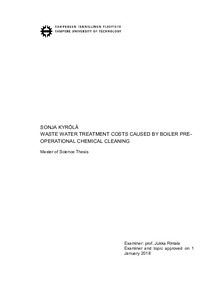Waste water treatment costs caused by boiler pre-operational chemical cleaning
Kyrölä, Sonja (2018)
Kyrölä, Sonja
2018
Ympäristö- ja energiatekniikka
Teknis-luonnontieteellinen tiedekunta - Faculty of Natural Sciences
This publication is copyrighted. You may download, display and print it for Your own personal use. Commercial use is prohibited.
Hyväksymispäivämäärä
2018-10-03
Julkaisun pysyvä osoite on
https://urn.fi/URN:NBN:fi:tty-201809172305
https://urn.fi/URN:NBN:fi:tty-201809172305
Tiivistelmä
Aim of this thesis was to clarify the factors affecting the treatment costs of boiler pre-operational chemical acid cleaning. Up to 1000 m3 of waste water may be produced during the chemical cleaning procedure prior to boiler startup. Is it possible to sewer most of that water, but there are also waters, which are challenging even for hazardous waste treatment processes. So far it has been slightly unclear, which are the waste water features that causes the highest treatment costs. Sometimes sewage treatment plant can treat all the waste water produced in the cleaning process, but occasionally, the whole amount must be transported to hazardous waste treatment plant.
In order to deal with the waste water treatment costs, the work was to find out which chemical properties the waste water has, and how compositions of different types of cleanings differ from each other. Composition data was collected from analysis of previous cleaning cases, and two analyses were carried out during the thesis. After that, specialists of both municipal waste water treatment plants and hazardous waste treatment plants were interviewed. Discussions revealed, how each chemical property affect the used treatment method and which are those features that disable water sewage.
In order to deal with the waste water treatment costs, the work was to find out which chemical properties the waste water has, and how compositions of different types of cleanings differ from each other. Composition data was collected from analysis of previous cleaning cases, and two analyses were carried out during the thesis. After that, specialists of both municipal waste water treatment plants and hazardous waste treatment plants were interviewed. Discussions revealed, how each chemical property affect the used treatment method and which are those features that disable water sewage.
